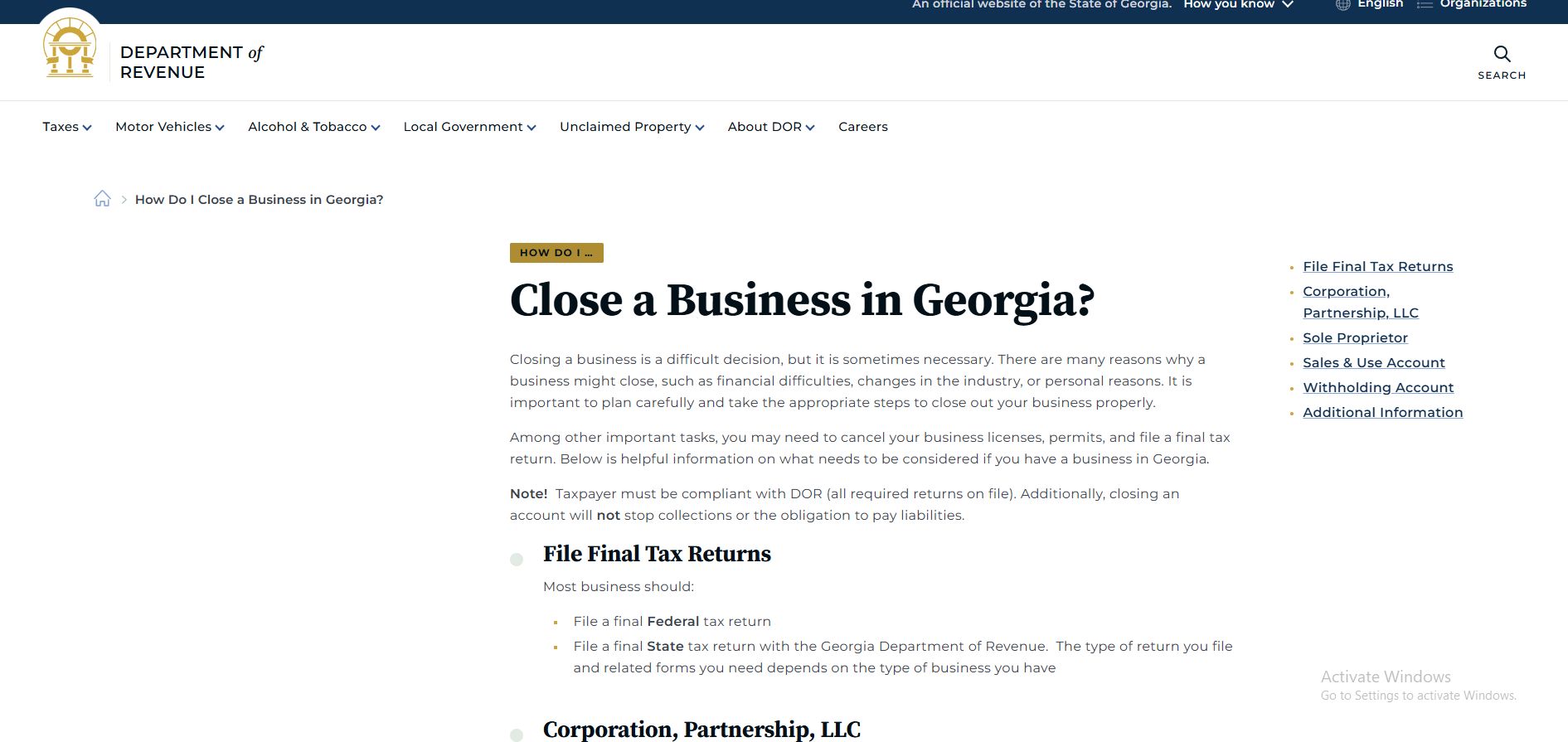Dissolving an LLC in Georgia involves following a formal process to ensure your business is legally and financially closed. Here’s a quick summary of the steps:
- Review Your Operating Agreement: Check for specific dissolution procedures, voting requirements, and asset distribution rules. If no agreement exists, Georgia state laws apply.
- Get Member Approval: Secure unanimous or majority consent (as required) from LLC members and document the decision.
- Cease Operations: Stop business activities, notify your registered agent, cancel licenses/permits, settle debts, and distribute assets.
- File Articles of Dissolution: Submit Form CD-415 to the Georgia Secretary of State. Filing costs $10, and online submissions are free.
- Handle Taxes: File final tax returns, close tax accounts, and cancel your EIN with the IRS.
- Maintain Records: Keep essential documents (e.g., tax returns, contracts) for at least 7 years.
Key Tip: Consult a business attorney or tax professional to ensure compliance and avoid future liabilities. Skipping steps can lead to ongoing legal and financial obligations.
Follow these steps to dissolve your LLC properly and protect yourself from potential risks.
Step 1: Preparing for LLC Dissolution
Getting your LLC ready for dissolution involves meeting all legal and internal requirements. This initial step is crucial to ensure you comply with the law and avoid headaches later on. Once you’ve taken care of these preparations, you can move on to addressing your LLC’s financial and legal obligations.
Review Your Operating Agreement
Your operating agreement is your guide for dissolving the LLC. It likely outlines the exact steps you need to follow, such as voting procedures, how to distribute assets, and the roles of members during the process.
Check your operating agreement for details on voting requirements – some may call for a simple majority, while others might need a supermajority or even unanimous consent. It will also explain how to handle assets and any specific steps for dissolution.
If your LLC doesn’t have an operating agreement, don’t worry. In Georgia, the default state laws for LLCs will apply. Typically, these laws require unanimous consent from all members to dissolve the company. Additionally, review your Articles of Organization to see if they include any specific rules about dissolution.
If the process seems complicated or unclear, it’s a good idea to consult a Georgia business attorney. They can clarify the legal requirements and help you navigate any tricky parts. Getting professional advice early can save you time and money later. Once you’ve reviewed the procedures, you’ll need to move on to securing formal approval from the members.
Get Member Approval
With a clear understanding of the steps, the next move is to get approval from your LLC’s members. Georgia law generally requires unanimous consent unless your operating agreement specifies a different voting threshold.
Organize a meeting with all members to discuss and vote on the dissolution. Document the process thoroughly – this could be through meeting minutes or a signed consent form. Make sure you meet any specific voting requirements outlined in your operating agreement. Proper documentation is vital and should clearly state the decision to dissolve, along with the date it was made.
Although not mandatory, you might also consider filing a Statement of Commencement of Winding Up (Form CD 414) with the Georgia Secretary of State. This optional step signals that your LLC is officially beginning the dissolution process.
Wind Up Business Operations
Once member approval is secured, your LLC must cease operations and start wrapping up its business activities. This step is essential to avoid leaving any unresolved issues that could cause problems later.
Notify your registered agent about the dissolution. Cancel any licenses, permits, or registrations your LLC holds. Address any outstanding issues, such as disputes or grievances. Collect unpaid receivables, pay off taxes, and settle any remaining debts. After that, distribute the LLC’s remaining assets to members according to your records and operating agreement.
Once all financial matters are resolved, close the LLC’s bank accounts. File final tax returns with both state and federal authorities.
If your LLC operates in other states as a foreign LLC, don’t forget to withdraw those registrations as part of the winding-up process. Georgia law requires you to complete all these tasks, and skipping any of them could lead to financial or legal complications down the line.
Step 2: Handling Financial and Legal Obligations
Once you’ve secured member approval and started preparing for dissolution, it’s time to address the financial and legal responsibilities tied to your LLC. Taking care of these ensures both the LLC and its members are shielded from potential liabilities down the road.
Notify Creditors and Settle Debts
Reach out to creditors to explain your LLC’s dissolution and negotiate payment terms. The Georgia Attorney General’s Consumer Protection Division emphasizes the importance of working directly with creditors instead of involving collection agencies.
As they advise: "If you owe the debt but do not have money available to pay it, ask the debt collector if you can work out a payment plan. Be honest about what you can afford to pay" and "If the agency does agree to a new payment plan, get it in writing". Always document any reduced settlements in writing to avoid future misunderstandings.
Cancel Licenses, Permits, and Registrations
Gather all licenses, permits, and registrations tied to your business and cancel them properly. Overlooking this step could result in ongoing tax liabilities or administrative fees, even after the LLC is dissolved.
For Georgia tax accounts, log into the Georgia Tax Center, select "Request to Close Account", input your cease date, and submit the form. Updates are typically processed within 48 hours. Similarly, local business licenses, such as those required in Atlanta, must be canceled following the specific procedures of each city. Don’t forget to address professional licenses, environmental permits, health certifications, and other industry-specific registrations, as each type often has unique cancellation requirements and timelines.
Distribute Remaining Assets
Check your operating agreement for instructions on how to distribute assets among members. If no clear process is outlined, Georgia law requires following the LLC’s articles of organization or any written agreements between members. Before distributing assets, ensure all debts, taxes, and expenses are fully paid. In cases where no specific plan exists, dividing assets based on each member’s ownership percentage is a common approach.
Document the distribution process thoroughly to comply with your operating agreement and state law. It’s also wise to consult a tax professional to understand the tax consequences for both the LLC and its members before finalizing any distributions.
Make sure all these steps are completed before submitting your Articles of Dissolution to the Georgia Secretary of State.
Step 3: Filing Articles of Dissolution with the Georgia Secretary of State
Once your financial and legal obligations are squared away, the final step is to officially dissolve your LLC by filing the necessary paperwork with the state. This process ensures your business entity is formally removed from Georgia’s records.
Complete the Articles of Dissolution Form
To legally dissolve your LLC in Georgia, you’ll need to file Form CD-415 Certificate of Termination with the Corporations Division of the Secretary of State. This document requires the following details:
- Your LLC’s exact legal name as registered.
- A statement confirming that all debts, liabilities, and obligations have been settled, discharged, or accounted for.
- A declaration that there are no pending legal actions against your LLC, or that provisions have been made to satisfy any potential judgments, orders, or decrees.
The form must be signed by an authorized individual, such as an LLC member or a legal representative. Double-check that all information matches your official LLC records to avoid delays.
Pay the Filing Fee
The filing fee for dissolving an LLC in Georgia is $10.00 if you submit the paperwork in person or by mail. However, if you file online, there’s no fee – making it the most budget-friendly option. Payments can be made via credit card, direct account transfer, or payment pick-up, and the online system provides step-by-step instructions for completing the transaction.
If you need expedited processing, Georgia offers several options at additional costs:
- 24-hour expedited service: $100.
- Two business days expedited service: $120.
- Same-day service: $275 (requests must be submitted by noon).
- One-hour expedited service: $1,200 (available from 9:00 a.m. to 4:00 p.m. on business days).
Submit the Filing
You can file your Certificate of Termination online, by mail, or in person. Online filing is the quickest method, with processing times typically ranging from 7 to 10 business days. Paper filings – whether mailed or hand-delivered – take longer, usually around 15 business days. If mailing your documents, using certified mail can help you track delivery.
Keep in mind that processing times may be longer during high-volume periods, such as late December through January or at the end of each quarter (late March, June, and September). Once your Certificate of Termination is processed and approved, your LLC will be officially dissolved in Georgia. Be sure to keep the confirmation of filing for your records.
sbb-itb-ba0a4be
Step 4: Post-Dissolution Compliance and Recordkeeping
Filing your Articles of Dissolution is just one step in wrapping up your LLC. To fully close out your business and protect yourself from potential liabilities, there are several key tasks you’ll need to handle.
Finalize Tax Obligations
Your tax responsibilities don’t end with filing for dissolution. To avoid penalties or legal troubles, you’ll need to settle all tax matters with both the IRS and the Georgia Department of Revenue.
Start by filing your final federal tax return, which should include all profits and losses for your LLC’s last operating year. For state taxes, submit your final Georgia tax return using the appropriate form – Form 600, Form 600S, or Form 600T – based on your LLC structure. Be sure to check the box indicating it’s your final return and include a written explanation.
If your LLC collected sales tax or had employees, you’ll also need to close those accounts. Use the Georgia Tax Center (GTC) to request account closures by selecting "Request to Close Account" and entering your cease date. For assistance, you can email [email protected] or [email protected].
Don’t forget to cancel your Employer Identification Number (EIN) with the IRS. To do this, send a letter with your LLC’s legal name, EIN, business address, and the reason for closing to the IRS office in Cincinnati, OH 45999. For added peace of mind, you might want to request tax clearance letters from both the IRS and the Georgia Department of Revenue as proof that all taxes are settled.
Maintain Business Records
Once your tax filings are complete, you’ll need to organize and securely store your business records. These documents are essential in case of audits or legal issues. Both the IRS and the Small Business Administration recommend keeping key records for several years after your LLC closes. Here’s a quick guide to retention periods:
| Record Type | Retention Period |
|---|---|
| Federal, state, and local tax returns and supporting documentation | At least seven years |
| Employment tax records | At least four years after taxes were due or paid (whichever is later) |
| Employment records | At least one year |
| Asset records | At least three years after disposing of the asset |
| Insurance files | Permanently |
| Business documents (e.g., articles of organization, licenses, patents, contracts) | Permanently |
| Financial records (e.g., bank statements, sales records) | At least seven years |
Store digital records in a reliable cloud service, with backups on external drives. For paper documents, use fire-safe cabinets or safe deposit boxes to protect them from damage or theft. Once the retention period passes, shred sensitive documents to safeguard against identity theft or data breaches.
If you’re unsure about specific record-keeping requirements, consult an attorney or accountant for tailored advice.
Member Liability After Dissolution
Even after dissolving your LLC, it’s important to address potential liabilities. Members can still be held personally responsible for certain debts, especially if distributions were made while creditors remained unpaid.
A notable example is the 2014 case involving CB Richard Ellis and Terra Nostra. After Terra Nostra dissolved, it failed to pay a commission owed to a real estate broker. The broker sued and successfully recovered the unpaid amount from the LLC members, up to the amount they had received in distributions.
To avoid similar issues, make sure all debts are paid before distributing assets to members. If any liabilities are uncertain, consider delaying dissolution until the statute of limitations expires. Sending formal notices to creditors about the dissolution can also help limit the time they have to file claims.
Follow your LLC’s operating agreement and Georgia state laws for the proper steps in dissolution, including voting requirements and notifying creditors. Additionally, cancel all business licenses and permits as part of the process.
"Note: This article, like all of our articles, is to provide some general guidelines – always get specific advice for your situation." – KKOS Lawyers
When dealing with complex debts or legal concerns, working with an attorney can help ensure you’re fully protected from future liabilities.
Conclusion: Key Points for Dissolving an LLC in Georgia
Dissolving an LLC in Georgia requires careful attention to the state’s legal requirements. Beyond filing the Articles of Dissolution, following the proper steps is essential to avoid lingering legal or financial issues.
Start by reviewing your operating agreement to understand the dissolution process outlined for your LLC. Make sure to get approval from all members, cease business operations, and settle any outstanding debts before submitting the dissolution paperwork. Taking these steps ensures the process moves forward without unnecessary complications.
Once the dissolution is filed, close all IRS and Georgia tax accounts. Obtaining tax clearance letters is a critical step, as it reduces the risk of future audits. Keep detailed business records for at least seven years to safeguard against disputes or compliance issues down the road. Store both digital and physical copies securely, and dispose of sensitive documents responsibly after the retention period ends.
Remember, unresolved liabilities can lead to personal responsibility for unpaid debts, so it’s crucial to settle all obligations before dividing any remaining assets among members.
For added peace of mind, consult with an attorney or tax professional to confirm that all legal and financial requirements have been met. This extra step can help protect you from any unexpected issues in the future.
FAQs
What happens if I don’t properly dissolve my LLC in Georgia?
If you skip the necessary steps to dissolve your LLC in Georgia, the state might still consider your business active. This means you could remain on the hook for state fees, taxes, and compliance requirements. On top of that, creditors could come after the LLC for unpaid debts if you haven’t addressed liabilities or formally announced the dissolution. Overlooking these steps could even result in penalties or legal troubles, so it’s important to handle the process the right way.
How do I notify creditors when dissolving an LLC in Georgia?
When closing an LLC in Georgia, it’s essential to inform all known creditors and claimants about the dissolution. Send them a written notice that clearly states the LLC’s intent to dissolve, provides instructions on how to submit claims, and specifies a deadline for claim submissions. Under Georgia law, creditors must be given at least 60 days from the date of the notice to file their claims. Taking this step helps resolve any outstanding debts and ensures compliance with state regulations.
What tax considerations should LLC members be aware of when dissolving an LLC in Georgia?
Dissolving an LLC in Georgia can carry notable tax consequences for its members. Any profits or losses stemming from the dissolution typically need to be included on personal tax filings. Additionally, there are other tax considerations to be aware of, such as depreciation recapture or cancellation of debt income, which depend on the LLC’s financial activities leading up to its closure.
Under Georgia law, LLC members may also remain liable for specific pre-dissolution obligations for up to four years. To prevent potential issues, it’s vital to address all outstanding taxes and debts before finalizing the dissolution. Seeking guidance from a tax professional can help you navigate these requirements and reduce the risk of unexpected tax complications.









